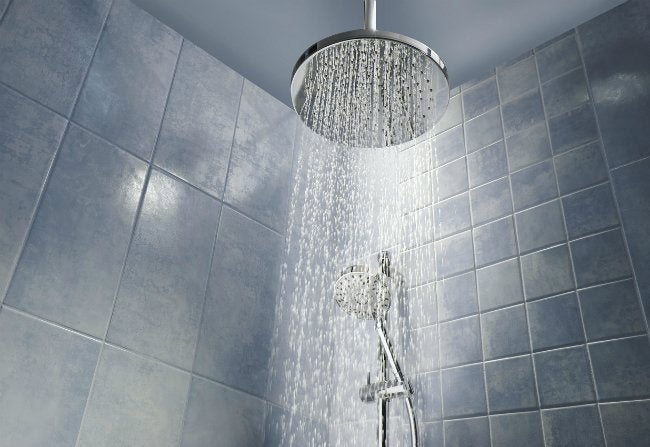Water heater not working? If your shower, washing machine, or dishwasher does not produce hot water, follow the troubleshooting tips below to restore heat as soon as possible.
Q: I went into the shower and it was warm, but it quickly cooled down and after an hour there was no hot water. What is wrong?
A: If no one has a monopoly on hot water throughout the day and there is no hot water in the house but there is water, the problem of no hot water is probably caused by the water heater.
First, check to see if your water heater is sized for your daily household usage; they range from 30 gallons to 80 gallons, with the smaller ones suited for the modest needs of a single person and the larger ones for a household with several children.
Assuming the water heater is large enough to fit your family’s needs, proceed to troubleshooting how a water heater that doesn’t heat depends on the type of water heater you have, gas versus electric.

First things first…
Bump up the thermostat.
The ideal operating temperature for a water heater is between 122 and 140 degrees Fahrenheit. Systems that fall below this range risk not only hot water shortages, but also the potential for Legionella growth. If your water heater is not yet set to the ideal range, adjust it; hot water should return in 30 to 40 minutes and reach a temperature that will prevent the growth of pathogens within two hours.

Check the weather forecast.
Sudden cold weather in your area can affect the effectiveness of gas- or electric-powered water heaters, causing them to shut down. This most often happens at night when the heater is not in use and the temperature plummets. If recent weather conditions match this scenario and your boiler is still running, try turning the water heater up to its maximum to kick it into back gear; after 30 minutes, turn on the kitchen or bathroom faucet and see if the water heats up after a few minutes. If it seems to be warming up, turn the water heater back to its normal temperature setting or a few degrees higher until it is cold enough.
For gas water heaters…
Re-light the pilot light.
If the pilot light on your gas water heater goes out due to a draft in the ventilation pipe or wind from an open window on a stormy day, see if you can easily relight it by following the instructions posted on the side of the unit. In some cases, such as if the pilot light on the water heater is located in an enclosed burner room, you may need to contact a plumber. However, if you smell gas, call the gas company immediately.
Repair thermocouple malfunction.
If ignition is successful but the flame does not go out when the knob is released, there may be a problem with the thermocouple (a safety device that senses when the pilot light goes out and stops the flow of gas). The tip of this copper tube should be in the pilot lamp flame, and if it is off, it needs to be adjusted or replaced. Thermocouples are not expensive and can be replaced as a DIY project.
Bring back the blue flame.
Is the water warm rather than cold? Is the pilot light burning yellow instead of blue? These are symptoms of a problem with the gas-to-air ratio. A yellow flame may indicate that the boiler is releasing carbon monoxide (a colorless, odorless, toxic gas). Check for drafts or open windows that may be reducing the combustion efficiency of the pilot light and remedy the windy conditions. If the pilot light still does not turn into a blue flame, call a technician to inspect the unit. In the meantime, watch for signs of carbon monoxide poisoning (dizziness, fainting, nausea) and, if necessary, leave the house immediately to seek medical attention.

Check the gas line.
If the pilot light does not come on when the gas valve is opened and there is no gas smell, there may be a problem with the fuel supply. Check to see if the gas valve is open or closed and visually check for kinks in the gas line. If adjusting the gas flow does not improve the problem, call the gas company to confirm that gas is available in your area and that you are not behind on your bills. If the gas company tells you that gas should be coming out, but there is no gas (or smell) when you turn the valve, you should contact a professional, such as a plumber.
If the water heater is running on electricity….
Restart the water heater.
Power surges from electrical storms can cause the current to go haywire. Try turning the electric switch off for a couple of minutes and then back on again; if there is no hot water after 30 minutes, you will need to move on to another solution. Proceed with caution. Before repairing or servicing the water heater, make sure the unit is turned off. These appliances draw enough power that an accidental electric shock could be fatal, so work carefully or call in a professional.
Reset circuit breakers.
If tripped, the water heater’s dedicated breaker may not appear to be “off,” but may still be just a little out of whack and very much in line with the other “on” breaker. Turn the breaker off, wait 20 seconds, and turn it back on. A breaker that cannot stay “on” may have failed due to age or overwork. If this is the case, ask a professional to replace it.

If it should fail….
Hire a professional.
Water heater repairs are technical in nature, and it is safer to leave it to a professional for safety reasons. If there is no breaker or the breaker needs to be replaced, hire a qualified electrician. Or, if the tank is leaking into the ground or inside the heater compartment, bring in a professional to service your water heater before you damage the heating element or stop the thermostat from functioning. He or she may check the heating element of the water heater to make sure it is functioning properly. You may also want to have a professional check that the high-temperature cutoff switch is working properly. If the water gets too hot, the heater can shut off completely.

The lifespan of a water heater is 10 to 20 years or more, depending on the type.
A typical water heater (the type with a large tank installed in an enclosed space) typically lasts about 10 years. Many tankless water heaters can be used for 20 years or more. If your water heater is nearing the end of its service life, it is likely that parts such as elements and thermostats will soon fail and need to be replaced. It is important to determine if it makes sense to replace the components. For standard heaters, it may be wiser to replace your water heater altogether and take advantage of the improved energy efficiency that a new unit would provide. However, in the case of tankless water heaters, replacing parts easily and affordably as needed can significantly extend the life of your tankless water heater without the need for replacement.
To avoid the misery of taking cold showers, replace your water heater before it breaks down.
Despite having already replaced the heating element in the water heater and performed other maintenance work, the water heater may not be working consistently and is left out in the cold. It may be time to replace the water heater before it fails altogether. Consider the age of the unit, the number of repairs it has undergone, the times you’ve had to “reset” it because you ended up with a popsicle in the shower, the strange noises it makes, and those worrisome leaks you noticed. If there are signs, it may be time to replace your water heater with a new, reliable unit.

Final Thoughts.
Whether you’re mid-shower or cleaning up after dinner, losing hot water is no fun. Fortunately, some surefire steps can help make sure you rarely encounter this problem or can fix it quickly if it does occur. Start by making sure you have the right water heater for your needs, keep that heater well maintained, and then, if something goes wrong anyway, go through the checklist of problem-solving steps to feel warm again.

FAQs on Causes of No Hot Water
Q: How do I reset my water heater?
For gas water heaters, you may need to relight the pilot light. For electric water heaters, press the reset button if available, or unplug the unit for a few minutes and plug it back in. If this does not work, reset the breaker on the water heater.
Q: What should I check first if there is no hot water?
First, check to see if the thermostat on the water heater is set properly. Ideally, it should be set to boil water between 122 and 140 degrees Fahrenheit.
Q: What causes hot water to stop running during a storm?
If a winter storm causes temperatures to drop, you may need to increase the heat setting on your water heater. Also, make sure your power or gas supply is not interrupted.
Q: What is the most reliable type of water heater?
Many consumers feel that tankless water heaters are the most reliable water heaters. These water heaters have fewer moving parts that wear out over time, and their parts are used only when needed to supply hot water on demand, not constantly as in storage tank water heaters.










